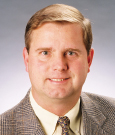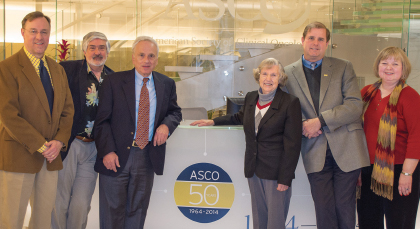ASCO’s State Affiliate Council is composed of the State Society Presidents and/or designated physician Council Representatives as well as the Executive Directors of each state and/or regional oncology society. The Council convened in late February to address the most relevant issues affecting oncology practices today.
For many years, ASCO has had a strong desire to bolster representation of the domestic membership on the ASCO Board of Directors. There are now three community oncology representatives on the ASCO Board, as well as designated representatives on the Nominating Committee. ASCO recognizes the importance of the community oncologists’ voice in shaping vision, directives, and policy.
To that end, the State Affiliate Council was formed in 2011, specifically to strengthen two-way communications. The Council now has direct access to the ASCO Board in addition to having Sandra Swain, MD, FACP, ASCO’s Immediate-Past President, serving as a liaison.
Finding Solutions to Saving Community Practices
At the recent State Affiliate Council meeting, Tom Barr, MBA, General Manager of Oncology Metrics, along with a four-physician panel discussed important concepts related to practice survival in 2014. The physicians, representing diverse practice environments, expressed a broad array of concerns, including such topics as accountable care organizations creating competition and patient steerage, implementing electronic health records, covering all the “quality measures” while efficiently managing patients, optimizing hospital employment relationships and contracting, ICD-10 implementation, uninsured patient populations and working with health-care exchanges, experience with the Community Oncology Medical Homes (COME HOME) innovation grant, and what shared cost savings may look like in the near future.
Mr. Barr provided some overarching tips to conceptually manage and enhance oncology practices going forward. Among those tips: learn to love Medicare rates, manage your drugs effectively, expect competition, embrace technology, empower the team concept, and don’t abuse your labor (yourself, that is).
Payment reform models were discussed at length. With our nation’s unsustainable debt driven partly by escalating health-care costs, Congress is looking at multiple methods of cutting health-care spending. Oncology is a particular target, with new health-care technologies, expensive cancer drugs, and more intensive therapies contributing to a dramatic growth in costs.
Congress Passes 1-Year
SGR Patch
Tremendous progress has been made over the past year to repeal the sustainable growth rate (SGR) system through the bipartisan, bicameral SGR Repeal and Medicare Provider Payment Modernization Act of 2014 (H.R. 4015/S. 2000), which ASCO has endorsed. Unfortunately, partisan politics over how to cover the cost of repeal stalled this bill, and instead, Congress patched rather than permanently repealed the flawed payment system.
With a 23% Medicare physician payment cut scheduled to take effect on April 1, the House and Senate acted at the last minute to enact the Protecting Access to Medicare Act of 2014 (H.R. 4302), which provides a yearlong patch to the flawed SGR system.
H.R. 4302 provides a 0.5% provider payment update through the end of 2014 and a 0% update for the first 3 months of 2015. It also includes a 1-year delay in the transition from ICD-9 to ICD-10 code sets. It pays for the patch with provider payment cuts, including cuts to payments for diagnostic laboratory tests, advanced imaging, and “misvalued” codes under the physician fee schedule.
Developing Alternative Payment Models
It is extremely important that ASCO, and all other oncology stakeholders, explore alternative payment models that provide evidence-based, high-quality, value-driven access to care. ASCO and the Community Oncology Alliance (COA) published a joint statement in this regard encouraging the development of promising payment structures, such as the Oncology Medical Home and Treatment Month Payment. These can work with Episodes of Care and Shared Cost Savings designs, as well as, Merit-Based Incentive Payment Systems.
The ASCO Dashboard Initiative was discussed by James Frame, MD, FACP, West Virginia Council representative and Council Chair-Elect. The ultimate purpose of the Dashboard is to enhance communication of trends and data as a mechanism to increase prospective systematic feedback from ASCO’s State Affiliates. This information will be shared with the ASCO Board and Committees in a way that assists in identifying and tracking practice, legislative, and other rising trends throughout the country.
The Dashboard will increase engagement within the Council and permit the State Affiliate Council to evolve its service mission in a rapidly changing environment. The Dashboard can form strategic and tactical decision-making for ASCO leadership. There is also the potential to augment and supplement current informal grassroots reporting and periodic survey tools for the domestic membership.
Getting Involved
The State Affiliate Council serves to identify and create positive actions for ASCO members. As a practicing hematologist/oncologist, I strongly encourage members to get engaged in their state societies and make use of their resources.
I also suggest that ASCO members contact their State Affiliate Council representative about practice concerns and issues that may need to be addressed on a national level. To find your representative, visit http://www.asco.org/about-asco/affiliates-map. ■
Dr. Page is a community hematologist/oncologist at The Center for Cancer and Blood Disorders in Fort Worth, Texas, where he serves as President and Research Director. He is an Adjunct Professor of Medicine and Pharmacology at the University of North Texas Health Science Center. Dr. Page is the current Chair of the State Affiliate Council and is President-Elect of the Texas Society of Clinical Oncology.



